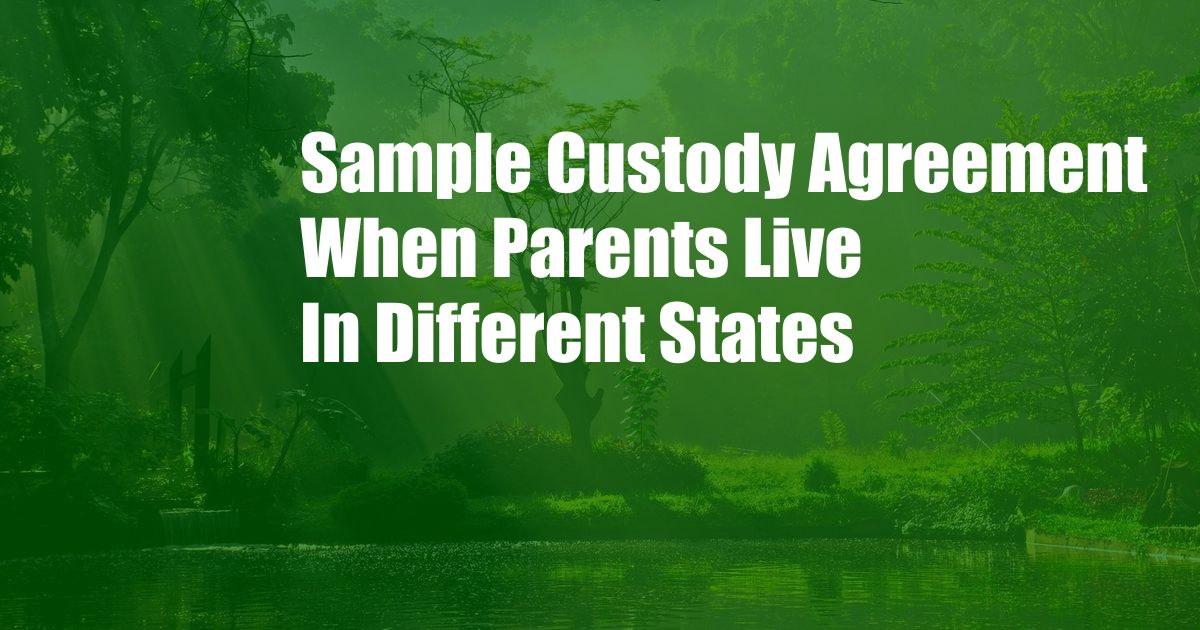
Navigating Joint Custody When Parents Reside in Different States: A Comprehensive Guide
As a parent, navigating the intricacies of child custody arrangements can be a daunting task, especially when you and your co-parent reside in different states. The complexities of distance, differing laws, and potential communication barriers can create unique challenges. To help you navigate this complex landscape, this comprehensive guide will provide a detailed overview of joint custody agreements when parents live in different states.
Co-parenting across state lines requires meticulous planning and cooperation between both parents. Effective communication is paramount to ensure that all decisions related to the child’s well-being are made jointly. Establishing clear and consistent lines of communication, whether through phone calls, video conferencing, or email, is essential for maintaining open dialogue.
Jurisdictional Considerations
Determining which state has jurisdiction over child custody matters is crucial. In most cases, jurisdiction is established based on the child’s primary residence. However, if the child has lived in different states in recent years, the courts may need to determine which state has the most significant connection to the child.
Once jurisdiction has been established, it’s important to understand the specific laws governing child custody in that state. Different states have varying standards for determining custody arrangements, such as the best interests of the child, the suitability of each parent, and the child’s preference (if age-appropriate). It’s advisable to consult with an attorney familiar with the laws of the relevant state to ensure that your rights and the child’s best interests are protected.
Joint Custody Arrangements
Joint custody is a legal arrangement where both parents share decision-making authority regarding the child’s upbringing, including education, healthcare, and religious upbringing. There are two main types of joint custody:
- Joint legal custody: Both parents share the right to make decisions regarding the child’s well-being.
- Joint physical custody: The child spends substantial time living with both parents, with specific schedules and arrangements agreed upon.
In cases involving different states, joint custody arrangements may require a collaborative effort between the parents and the courts of both states. This can involve interstate compacts, which are agreements between states that establish a framework for resolving custody disputes.
Challenges and Solutions
While joint custody can provide stability and continuity for the child, navigating the challenges posed by different states can be daunting. Common obstacles include:
- Communication barriers: Distance and different time zones can make it difficult to communicate effectively.
- Differing parenting styles: Parents may have different parenting approaches, leading to potential conflicts.
- Limited access to resources: Parents may have limited access to support systems and resources in their respective states.
To overcome these challenges, parents can adopt the following strategies:
- Establish clear communication protocols: Set regular times for phone calls or video chats, and use email or text messaging for quick updates.
- Seek professional help when necessary: Consider family counseling or mediation to facilitate communication and resolve conflicts.
- Explore interstate resources: Research organizations and agencies that provide support and guidance for parents with joint custody arrangements across state lines.
FAQs
Q: What factors do courts consider when determining joint custody arrangements?
A: Courts typically consider the best interests of the child, the suitability of each parent, the child’s preference (if age-appropriate), and the ability of the parents to cooperate and communicate effectively.
Q: How can I modify a joint custody arrangement if circumstances change?
A: To modify a joint custody arrangement, you will need to file a motion with the court in the state that has jurisdiction over the case. You must demonstrate that there has been a substantial change in circumstances since the original order was entered.
Q: What are my rights if my co-parent is violating the joint custody agreement?
A: If your co-parent is violating the joint custody agreement, you can file a motion with the court to enforce the order. The court may impose sanctions, such as fines or changes to the custody arrangement, to ensure compliance.
Conclusion
Navigating joint custody arrangements when parents reside in different states requires careful planning, collaboration, and a commitment to the child’s best interests. Understanding the jurisdictional considerations, available custody options, and potential challenges is essential. By employing effective communication strategies, seeking support when needed, and leveraging interstate resources, parents can overcome these challenges and create a stable and nurturing environment for their child.
Do you have any further questions or concerns regarding joint custody arrangements across state lines? Please feel free to reach out to an experienced attorney or family law professional for guidance and support.